MercoPress. South Atlantic News Agency
Tag: cattle
-
Thursday, June 28th 2012 - 07:47 UTC
FAO/OIE launch global strategy to eradicate foot and mouth disease world wide
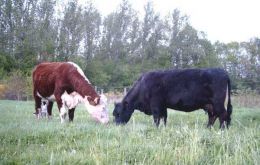
The Food and Agriculture Organization of the United Nations (FAO) and the World Organisation for Animal Health (OIE) are joining forces to combat foot-and-mouth disease on a global scale, laying out a detailed strategy to bring the devastating livestock disease under control.
-
Wednesday, March 14th 2012 - 23:52 UTC
Brazilian vessel looses half 5.000 cattle on board and has no port to dock

An animal welfare disaster resulting in the death of more than half the 5.000 cattle on board a Brazilian-owned live export ship bound for Egypt over the past fortnight has prompted renewed calls to ban the industry.
-
Thursday, January 12th 2012 - 14:12 UTC
Uruguay 2011 beef exports dropped 8% in volume, lowest since 2004
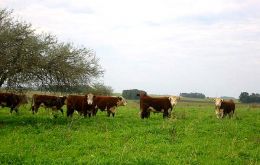
Uruguay beef exports last year dropped 8% in volume but soared 18% in value because of higher international prices and fewer cattle. However the volume was the lowest since 2004 and confirms a decreasing tendency since 2006, according to the latest figures released by the government.
-
Wednesday, November 23rd 2011 - 20:07 UTC
Brazil’s Marfrig deeper in the red but beef division manages turnaround
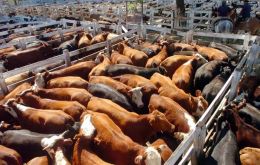
A slump the Brazilian currency Real landed Marfrig deeper in the red despite an improved operating result, lifted by takeovers and better tailoring its beef operations to a shortage of cattle.
-
Tuesday, November 1st 2011 - 22:18 UTC
Paraguayan FMD outbreak in September was caused by “human negligence”
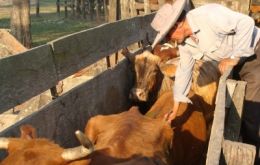
Paraguay’s Livestock Service has confirmed that negligence in the handling of foot and mouth disease vaccines was the cause for the September FMD outbreak that forced the country to cease exports. The announcement discards doubts about the quality of the vaccines.
-
Thursday, October 27th 2011 - 05:47 UTC
Uruguay’s flock at a historic low; number of cattle below 11 million

The latest update of Uruguay’s livestock census for the year ending last June 30 shows the number of cattle is below eleven million and the flock at its lowest since colonial times with 7.3 million head.
-
Friday, October 21st 2011 - 01:45 UTC
Beef per capita consumption in Argentina drops to half in 53 years
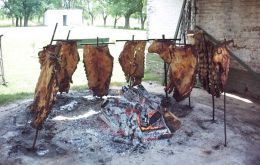
Beef consumption in Argentina registered in 2011 its lowest per capita in 53 years, having dropped approximately 50% from 98.4 kilos in 1958 to 53.4 kilos last June according to the Institute for the Promotion of Beef.
-
Wednesday, August 17th 2011 - 23:06 UTC
Record prices for Uruguayan beef but insufficient cattle in 2011/2012

Uruguay’s beef industry is short of cattle and the annual slaughter for 2011 is expected to be the lowest in a decade, similar to ten years ago when the foot and mouth disease crisis that isolated the country from world markets.
-
Tuesday, August 16th 2011 - 06:30 UTC
Takeovers’ glut and lack of cattle expose Brazilian leading meatpacker Marfrig

Brazilian leading meatpacker Marfrig will not be considering takeovers until 2012, Chief Executive Marcos Molina dos Santos said on Monday after the company posted a second-quarter net loss.
-
Thursday, August 11th 2011 - 06:27 UTC
Snow storms in Magallanes have left 300.000 sheep and 9.200 cattle at risk
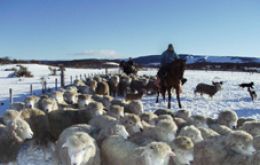
Almost 300.000 sheep and 9.200 cattle are exposed to serious life risk following heavy snow storms which covered the Magallanes Region in the extreme south of Chile with a white blanket anywhere between 70 and 150 centimetres thick.
